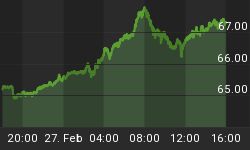Below is an extract from a commentary originally posted at www.speculative-investor.com on3rd April 2005:
There has recently been a debate amongst some gold market commentators about whether or not gold's recent poor performance relative to commodities constitutes evidence that the gold price is being suppressed by unnatural (read: non-free-market) forces. For example, one commentator has cited the fact that gold was trading a few hundred dollars an ounce higher the last time the CRB Index was trading near current levels. The last time the CRB Index traded near current levels was, by the way, at the beginning of the 1980s.
For the record, we are certain that the gold market is currently being manipulated by central banks and their agents (the unnatural forces mentioned above). The gold market always has been manipulated and probably always will be manipulated by governments because gold is the substance that the market will choose as money IF it is free to choose. Governments can't change the fact that gold has properties that make it better suited to perform the role of money than anything else ever discovered or invented by man; what they can do is attempt to find ways to overcome the restrictions on government expansion that would be imposed by a gold-based monetary system.
However, it is completely wrong to conclude that the current low value of gold relative to the CRB Index is evidence of gold market manipulation because over the long-term every market in the world oscillates between massive under-valuation and massive over-valuation. The below chart of the gold/CRB Index, for example, shows that the gold price rose by 150% relative to the CRB Index during 1979 and has since been in a downward trend. If this blow-off move in the gold price between early-1979 and early-1980 resulted in gold becoming massively over-valued relative to other commodities then we could logically conclude that the subsequent 20+ year downward trend was a correction to this over-valued condition. Interestingly, research done by Paul van Eeden in which he calculates a theoretical gold price based on the total quantity of US dollars confirm that gold WAS massively overvalued in 1980 (refer to http://www.gold-eagle.com/editorials_04/vaneeden030204.html and http://www.gold-eagle.com/editorials_04/vaneeden031604.html for details). In fact, according to Mr van Eeden's research a fair value for gold in 1980 would have been around $350.

The gold price rocketed higher during 1979 in response to fears that inflation was about to spiral out of control, but if not for these fears -- fears that ultimately proved to be misplaced -- the gold/CRB ratio would probably have remained at around its early-1979 level of 1:1. And if this had happened then gold would, from a superficial perspective, now appear to be slightly OVER-valued relative to commodities at the current gold/CRB ratio of 1.37. For reasons that we'll get into shortly we think gold is actually very UNDER-valued relative to commodities at its current price, but we wanted to show that an objective analysis of the historical gold/CRB data would not necessarily lead to the conclusion that gold was cheap at its current price.
We will now get to the main point we want to make. In fact, we think this is the single most important observation that can be made about the current financial market situation and is also something that has been completely overlooked by both sides in the above-mentioned debate over whether or not the current level of the gold/CRB ratio indicates gold market manipulation. The point is that despite the huge run-up in the CRB Index over the past few years an inflation problem is currently not being priced into any of the major financial markets. The lacklustre performance of gold relative to the CRB Index is just one sign of this non-pricing of a budding inflation problem. Another is the extremely low average earnings yield of US equities (a stock's earnings yield is the reciprocal of its P/E ratio, so a P/E ratio of 20 equates to an earnings yield of 5%). Yet another is the low level of long-term interest rates.
In other words, gold's performance relative to the CRB Index over the past two years has been totally consistent with everything else that has happened in the financial markets. If, however, the earnings yield on the S&P500 Index had risen from 5% to 10% (if the S&P500's P/E ratio had fallen from 20 to 10) over the past two years and the yield on a 10-year T-Note had risen from 4% to 10% over the same period then we could say that the markets were pricing in an inflation problem. In that case we could point to the current gold/CRB ratio as being evidence of manipulation. But, then again, in that case the gold/CRB ratio would almost certainly be at least 100% higher because it would not be possible for governments to keep a lid on the gold price under such conditions.
Now, with the evidence indicating that an inflation problem is currently NOT being priced into ANY of the financial markets we can be confident that gold is very under-valued at this time; a conclusion, by the way, that meshes with the above-mentioned research of Paul van Eeden. This, in turn, suggests that gold will out-perform the CRB Index by a wide margin over the next few years.
Lastly, you can't say in one breath that gold is money and in the next that gold should maintain a constant level relative to the CRB Index. The fact that gold is always the money chosen by the market guarantees that under a paper-based monetary system it will move from extreme under-valuation to extreme over-valuation and back again relative to the CRB Index in response to secular shifts in confidence.















